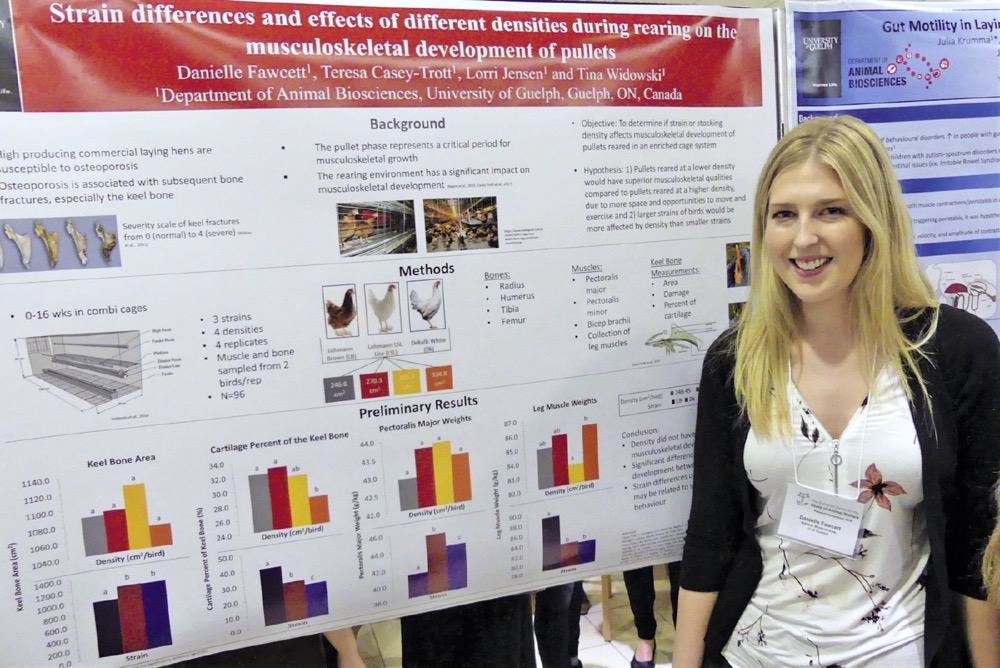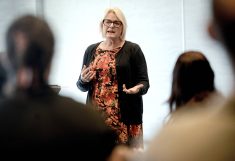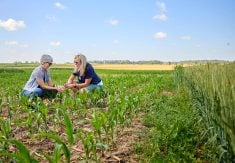The growing interest in animal welfare is providing opportunities for students studying animal behaviour and management.
The most recent edition of the annual Research Symposium of the Campbell Centre for the Study of Animal Welfare (CCSAW) provided strong evidence there are now post-university career opportunities for those interested in the topic.
Why it matters: With greater consumer interest in animal welfare, the Campbell Centre provides a place for sometimes challenging research to be shared, including topics like euthanasia of livestock and poultry.
Read Also

Canada seventh-most influential country on agri-food
Report from Dalhousie University and MNP shows Canada ranks seventh among G20 countries on agri-food influence.
The Symposium featured 15-minute presentations by 18 University of Guelph-based researchers covering a range of animal welfare-related topics. Morning sessions focussed mainly on poultry; early afternoon topics tackled mainly pet species (one student also addressed “boredom-like states in mink”), and dairy cattle provided a late afternoon focus.
Danielle Fawcett is the recently hired Animal Care Inspector for Egg Farmers of Ontario (EFO) and soon-to-be Masters-level graduate from the University of Guelph. She didn’t make one of the 15-minute presentations; instead, she was among 11 students given the opportunity to host a poster explaining their work during the mid-morning coffee break.
More space means less hen osteoporosis
Fawcett’s study, entitled “Strain differences and effect of different densities during rearing on the musculoskeletal development of pullets,” made use of already-euthanized birds that had been part of an earlier study about “comfort behaviours” (wing-flapping, feather-grooming) among laying hen pullets under varying space allocations.
She had been working as a research assistant in the Animal Biosciences lab of Professor Tina Widowski (currently the Egg Farmers of Canada Research Chair in Poultry Welfare), so it made for a seamless transition to take on a separate study involving these same birds for her Master’s thesis.
Fawcett’s research symposium poster explained that commercial laying hens are susceptible to calcium deficiency-induced osteoporosis due to the high calcium needs for egg production. She dissected pullets at various stages of maturity, raised under varying cage density scenarios, and assessed the degree of keel bone development. Results indicated pullets raised with more space had greater cartilage development, thereby lessening the likelihood of osteoporosis onset as adult birds.
The Winchester, Ontario native wasn’t focused only on her research during that time, however. She also had her post-university future in mind, and applied in March, 2018, for one of three Animal Care Inspector positions to be hired by EFO. In late April, she was offered one of the jobs — part-time beginning in June, then full-time once she completes her degree later this year.
Seated in the audience at the 2018 CCSAW Research Symposium, meanwhile, was at least one of the 2017 Symposium presenters. Caitlin Woolcott, now employed by livestock feed manufacturer New-Life Mills, completed her Master’s degree last year after being part of a multi-year project tackling euthanasia in poultry — a project with collaborators not only at Guelph but also at the University of Saskatchewan and Iowa State University. During the coffee break, Woolcott could be seen offering encouragement to a handful of this year’s presenters on topics connected to the multi-year project.
She said in an interview the broad perspectives provided by studying through the CCSAW prepared her well for stepping into an agribusiness career in Ontario.
Derek Haley, associate professor of Animal Behaviour and Welfare and the chair of the CCSAW Steering Committee, says Fawcett and Woolcott’s job-search successes are part of an ongoing trend for livestock-sector employers to put greater focus on animal welfare. He described the decision 27 years ago to establish the Centre through memorial funds donated by Mona Campbell as prescient, coming at a time when animal welfare enjoyed far less priority in the nation’s agricultural sector than it does today.
For today’s graduates entering the job market, that decision is now paying dividends.
Haley refers to the Centre as “a virtual hub” without any bricks and mortar, per se, but pulling in students from various disciplines ranging from livestock nutrition to animal care to psychology.
“Everybody has an opinion about animal welfare… and we try to inform that opinion with science,” he said of the goals of the steering committee.
During weekly lunchtime sessions, students are encouraged to come and communicate what they need to continue or enhance their research. The steering committee then discusses ways the student might gain access to the expertise they need from departments other than their own. For more on the centre, visit the University of Guelph website.















